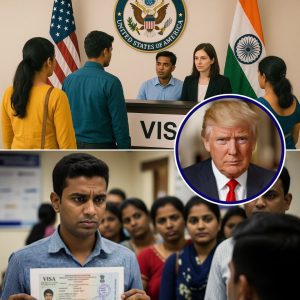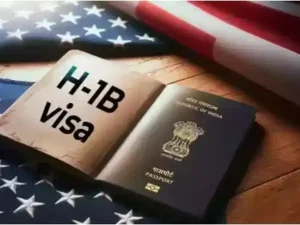Washington D.C. – The US government shutdown that began at 12:01 am on October 1 has brought critical immigration services to a halt, creating significant challenges for thousands of Indian professionals seeking H-1B visas and employment-based green cards. The suspension of federal funding has particularly impacted the Department of Labour, a crucial agency in the visa approval process.
As the US government shutdown continues with no announced end date, several federal agencies have ceased operations, leaving employees on unpaid leave or working without compensation. Immigration services have emerged as one of the hardest-hit sectors, with processing delays expected to affect Indian nationals disproportionately.
Department of Labour Operations Halted
:max_bytes(150000):strip_icc()/GettyImages-78053739-9567c824d71a4b0f9d8d8c207e1410c1.jpg)
The US government shutdown has severed funding to the Department of Labour, which plays an essential role in H-1B visa and green card processing. Immigration lawyers have confirmed that this funding freeze directly impacts new visa applications and employment-based immigration pathways.
Before any company can sponsor an H-1B visa, it must file a Labour Condition Application (LCA) with the Department of Labour. Approval of this application is mandatory before the case can proceed to immigration authorities. Additionally, the Labour Department issues PERM certification, enabling individuals to pursue employment-based green cards.
With funding suspended during the US government shutdown, applicants who did not receive LCA approval before October 1 face indefinite delays. According to immigration lawyer Henry Lindpere from Manifest Law, “nobody can get a new H-1B, transfer employers, or change status to H-1B unless they already got the LCA signed before today. H-1Bs will be unavailable until the DOL resumes operations.”
Severe Impact on Indian Professionals


The US government shutdown stands to significantly affect Indian professionals, who constitute over 71 percent of H-1B visa beneficiaries, making them the largest group impacted by the current situation. This demographic concentration means that any disruption to visa processing disproportionately affects the Indian diaspora.
Sophie Alcorn, a Silicon Valley-based immigration lawyer, identified the “biggest immediate impact” for Indian applicants as stemming from the Labour Department suspension. She explained that while applications already under review may continue processing, new applicants will face the most severe consequences.
“The shutdown creates a mixed bag of consequences, hitting new applications the hardest while largely sparing those already in process. For the Indian diaspora, who represent a huge portion of H-1B and employment-based green card applicants, the biggest immediate impact comes from the department of labour,” Alcorn stated.
Limited Relief Through USCIS Operations
Despite the US government shutdown affecting numerous federal agencies, some hope remains for certain visa applicants. The US Citizenship and Immigration Services (USCIS) can continue processing applications because it operates on visa fees rather than congressional appropriations.
Applicants who received their labour certifications before the shutdown may see their cases proceed through USCIS. However, this provides limited relief as new applications cannot advance without Department of Labour approval, which remains suspended during the US government shutdown.
Compounding Challenges for Indian Applicants


The current US government shutdown adds another layer of difficulty to an already challenging immigration landscape. The Trump administration has announced major changes to the H-1B visa system that would significantly impact Indian professionals.
Recent policy shifts include a steep $100,000 fee increase for new H-1B visa applicants and an overhaul of the existing lottery system to prioritize higher-wage workers. These changes, combined with the processing freeze caused by the US government shutdown, create unprecedented obstacles for Indian professionals seeking employment opportunities in the United States.
Historical Context and Duration Concerns


The US government shutdown that commenced on October 1 has no announced conclusion date, raising concerns about extended delays in immigration processing. Historical precedent suggests potential for prolonged disruption.
The last federal shutdown occurred during President Donald Trump’s previous term, lasting 35 days from December 22, 2018, to January 25, 2019. That shutdown became the longest in over four decades, and similar duration could compound difficulties for visa applicants waiting for processing to resume.
President Trump has indicated that the current US government shutdown could facilitate significant federal workforce reductions. “A lot of good can come from shutdowns, we can get rid of a lot of things we didn’t want, and they’d be Democrat things,” Trump stated, suggesting the administration views the shutdown as an opportunity for restructuring federal operations.
Implications for Future Applications
The US government shutdown creates uncertainty for thousands of Indian professionals planning to work in the United States. Those who did not secure labour certification before October 1 must wait indefinitely for processing to resume, potentially affecting employment start dates, project timelines, and career opportunities.
The shutdown’s timing particularly impacts companies planning to sponsor new H-1B workers or facilitate employer transfers for existing visa holders. Without access to Department of Labour services, these processes remain frozen regardless of applicant qualifications or employer needs.
Conclusion
The US government shutdown represents a critical disruption to immigration services, with Indian professionals bearing the brunt of processing delays. Until federal funding resumes and the Department of Labour reopens, new H-1B visa applications and employment-based green card processes remain suspended, leaving thousands in professional limbo while awaiting resolution.

